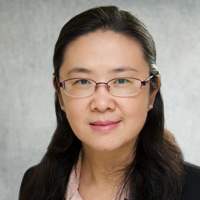
What is your hometown?
I was born and raised in Lanzhou, China. Now, Iowa City feels like and is my home.
When did you join the University of Iowa faculty?
2014
How/when did you become interested in science and medicine?
My mother is a physician and my father is a chemist. Both contributed to my interest in science.
As an undergraduate, I was drawn to chemistry and biology, and eventually chose to major in biology. In Ohio, I pursued a PhD degree in biomedical sciences in the area of molecular biology.
I was inspired to study molecular biology because I felt I could enhance the understanding of the pathogenesis of disease.
What interested you to pursue a career in Diabetes and Obesity?
Our world is facing a rising obesity epidemic. Obesity greatly increases the risk for many human diseases. Given my interest, my degree and the work of the FOEDRC, it seemed that I had found the perfect match.
Is there a teacher or mentor who helped shape your career?
Gokhan Hotamisligil, my mentor at Harvard, taught me how to be a professional scientist. I respect him greatly.
Dale Abel and John Engelhardt are my career mentors. They want me to succeed and are giving me the time to grow. I feel their support and concern for me as a scientist and as an individual.
How or why did you choose the University of Iowa?
I came to Iowa because faculty members here want me to be an excellent scientist and a whole person.
The University of Iowa’s faculty members are united to provide exceptional patient care while advancing innovations in research and medical education. How does your work help translate new discoveries into patient centered care and education?
Ultimately what I learn will help with patient care. We are working on understanding how obesity contributes to diabetes at the cellular and molecular level, which will provide insight for developing therapeutic strategy for obesity and diabetes
Indirectly, my work and the work of the FOEDRC will help the community understand the connection between obesity and nutrition, stress and exercise.
What kinds of professional opportunities or advantages does being a faculty member at an academic medical center provide?
As a result of the UI Health care structure – College of Medicine and the UIHC organization – scientists and physicians are able to collaborate closely.
Scientists could have access to patient data and human tissue, and more importantly, researchers and physicians working together will enrich our understanding and treatment of diabetes and obesity.
Please describe your professional interests.
I am a biomedical scientist and am very much committed to providing a greater understanding of obesity. As a scientist, my goals are
- To discover the molecular mechanisms that underlying the pathogenesis of human disease.
- To develop therapeutic approaches or tools to treat obesity-associated diseases.
I also believe I have a responsibility to teach my students and trainees how to do research well. I want to help prepare the next generation of scientists. My hope is that my students develop a passion for science and pursue research with a serious attitude.
What led to your interest in your field?
Initially I studied organelle stress response in osteoarthritis, wherein nutrient deprivation contributes to chondrocytes and cartilage denegation.
Obesity is caused by too much nutrients or an enrichment of nutrients. That intrigues me to find out how the body and cells deal with too much food.
How does working in a collaborative and comprehensive academic medical center benefit your work?
I am able to work with a wide variety of scientific and medical experts from many disciplines, trainings and backgrounds. Working with others who have complimentary skills to mine, allows for a better understanding of obesity and metabolic disease, and what possibilities there may be to treat obesity-associated diseases.
What are some of your outside interests?
My son who is 3 years of age.
I like to jog when I have the time. I enjoy cooking Chinese dishes. I am also learning how to bake.
Do you have an insight or philosophy that guides you in your professional work?
Don’t pay attention to achievement; pay attention to progress.
If you could change one thing about the world (or the world of medicine/science), what would it be?
More focus would be placed on prevention of human diseases.
What is the biggest change you've experienced in your field since you were a student?
The trend shifts from bench work to big data technologies and analysis.
What one piece of advice would you give to today's students?
Research is a long journey. Persist and be passionate.
What do you see as "the future" of medicine/science?
Prevention. More focus on preventing disease.
In what ways are you engaged with the greater Iowa public (i.e. population based research, mentoring high school students, sharing your leadership/expertise with organizations or causes, speaking engagements off campus, etc.)?
Presentations and meeting with donors.